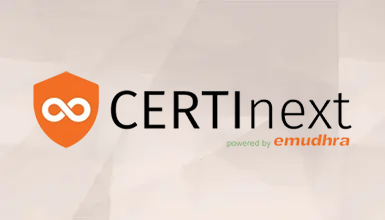Digital Trust. Where Security Meets Peace of Mind.
Through trusted identities in a Zero Trust World

Digital Transformation in Logistics - emSigner at Toyota Astra Motors
View Case Study
NIST PQC Standards are here. Learn how emCA is fully prepared for the quantum-resistant future!
Learn More
CertiNext, a PKI and CLM focused organization in the US
Read Blog

and eSignature solutions that transform organizations, not just workflows
TCS leverages emSigner Enterprise to continually digitize more functions across the globe. While the utilization started with procurement in a limited geographic scope, the engagement has scaled over time to continually digitize not just procurement, but more functions like HR & Finance across the globe. emSigner has helped to drive process efficiency by over 78%, driving down associated costs significantly, while paving way for environmentally friendly processes.
We simplify complex solutions through a comprehensive stack
We help you extract value in every engagement

"Reliable product and value for money as its improves our business processes smoothly"
Rating: 4.0Company Size: 50M - 250M USD
"Best Functionality and Value for Money."
Rating: 4.0Company Size: 1B to 3B USD
"Easy to integrate and use and good support from Technical team"
Rating: 5.0Company Size: 50M - 250M USD

How Conn’s Streamlined eSigning Across 170+ Stores to Boost Efficiency, Cut Costs, and Accelerate Retail Contracting with emSigner
View Case StudyWe drive impact at scale
0 million+
identities issued
0 +
trees saved
0 million+
documents signed
We're recognized by Industry experts

emSigner recognized in Gartner's eSignature Market Guide Report as an 'Enterprise Full Service eSignature Solution Provider'.
emSigner and emCA have been mentionedin a number of Gartner reports over the years
View More
Read Frost & Sullivan's report focused on understanding the current market landscape of PKI where growth is expected to continue at more than 30% YoY. The report also talks about how eMudhra is placed in the industry and our leadership position in India.
View More
eMudhra is ranked 1st amongst 42 vendors in the 'Identity and Digital Trust' space in India in IDC's semi-annual market tracker. eMudhra has consistently led the space and expanded to operate in more than 30 countries today where aim to make a difference.
View MoreTrust. Privacy. Compliance. Best Practices.
When you work with eMudhra, you can rest assured that you'll have peace of mind. We hold ourselves to the highest standard of operations.
GDPR
Regulation and controls on privacy & protection of personal data
SOC 2 Type 2
Assessment of effectiveness of internal controls on protection of consumer data
21 CFR Part 11
FDA's regulation for electronic documentation and electronic signatures
HIPAA
Certification towards ensuring privacy, security, and integrity of protected healthcare data
ISO
Standards organization defining several quality adherence specifications.
Webtrust
Set of principles and standards for operating publicly trusted Public Key Infrastructure
CMMI 5
Standards for enhancing Business process optimization through continual technological improvement
Customers mean everything to us.








Recognized for Excellence
Our industry accolades reflect our commitment to innovation customer satisfaction and our global reach. These recognitions inspire us to keep pushing boundaries in secure digital transformation.

Regulation and controls on privacy & protection of personal data

emSigner - eSignature Category

eSignature & Contract Management Category

emSigner - eSignature Category
Industry Updates

Key Highlights from PKIC Post
The PKIC Post covered significant updates in public key infrastructure (PKI), focusing on automation, post-quantum
cryptography readiness, and interoperability between identity ecosystems. Industry leaders emphasized the need for stronger certificate lifecycle management and governance to enhance security and compliance

Quantum Crypto Conference – Austin, TX
The Quantum Crypto Conference brought together experts to discuss advancements in quantum-resistant cryptography
and its impact on cybersecurity. Key topics included the transition to post-quantum cryptographic algorithms, NIST’s PQC standardization progress, and practical implementation challenges for enterprises preparing for a quantum-secure future.
.webp?width=350&height=200&name=industry-domain-validation%20(1).webp)
Pros and Cons of the New DV Profile for IGTF Certificates
The proposed DV (Domain Validation) profile for IGTF (Interoperable Global Trust Federation)
certificates aims to simplify issuance processes while maintaining baseline security. Pros include faster deployment, cost-effectiveness, and broader accessibility. Cons include reduced assurance levels compared to OV/EV certificates, potential vulnerabilities in automated validation, and challenges in meeting high-assurance security requirements.

Importance of CBOM for Crypto Agility
A Cryptographic Bill of Materials (CBOM) is crucial for organizations to maintain crypto agility in an evolving security
landscape. By cataloging cryptographic assets across IT infrastructure, CBOM helps in identifying weak cryptographic implementations, planning smooth algorithm transitions, and ensuring compliance with emerging security standards. As quantum threats loom, CBOM becomes a key enabler for proactive risk mitigation and cryptographic resilience.


 PKI Authentication
PKI Authentication Workflow Solutions
Workflow Solutions Remote Sign Solutions
Remote Sign Solutions Bulk Sign
Bulk Sign MFA
MFA IAM
IAM  Managed PKI
Managed PKI CLM
CLM Trust Services
Trust Services Enterprice PKI
Enterprice PKI